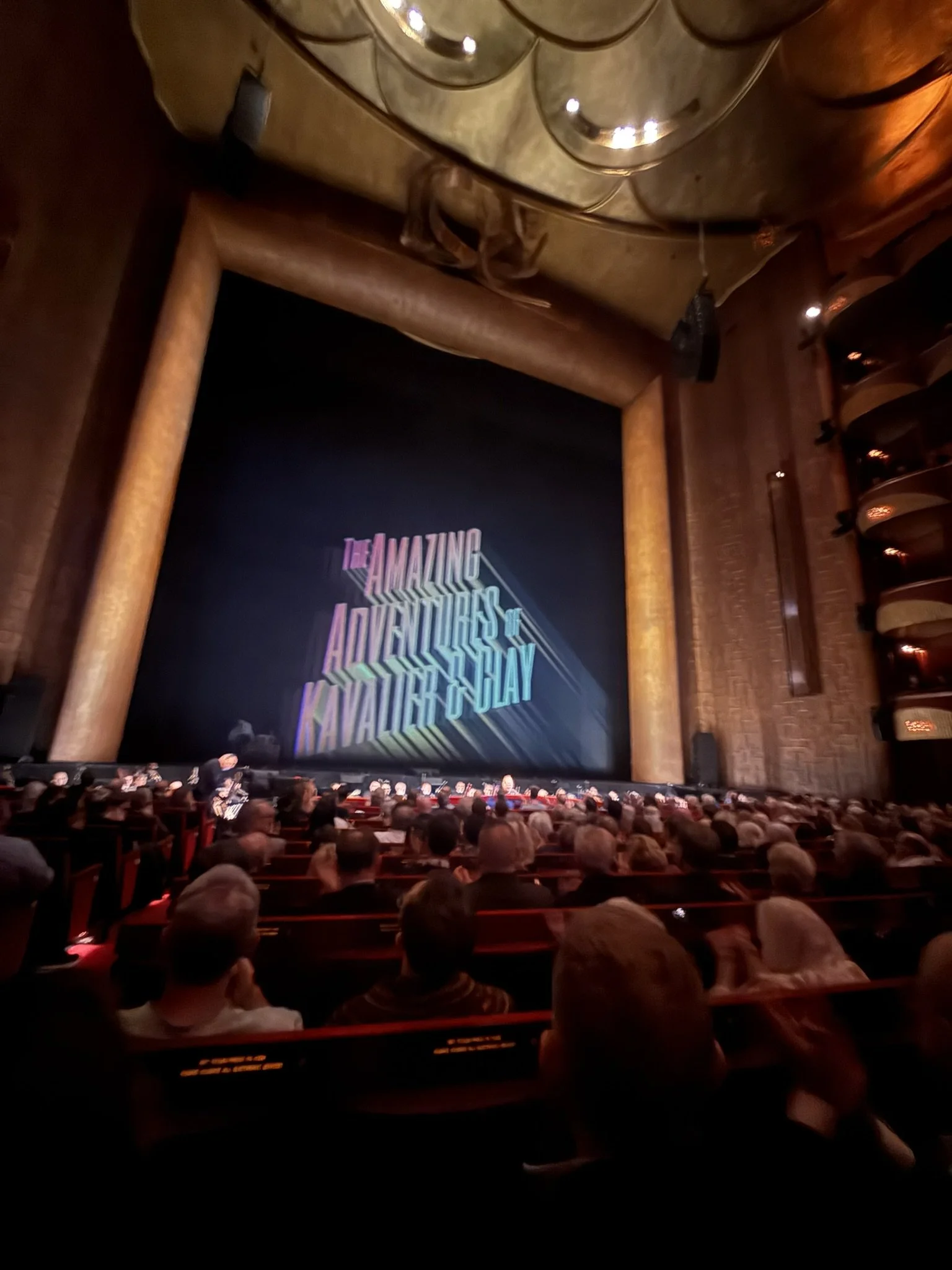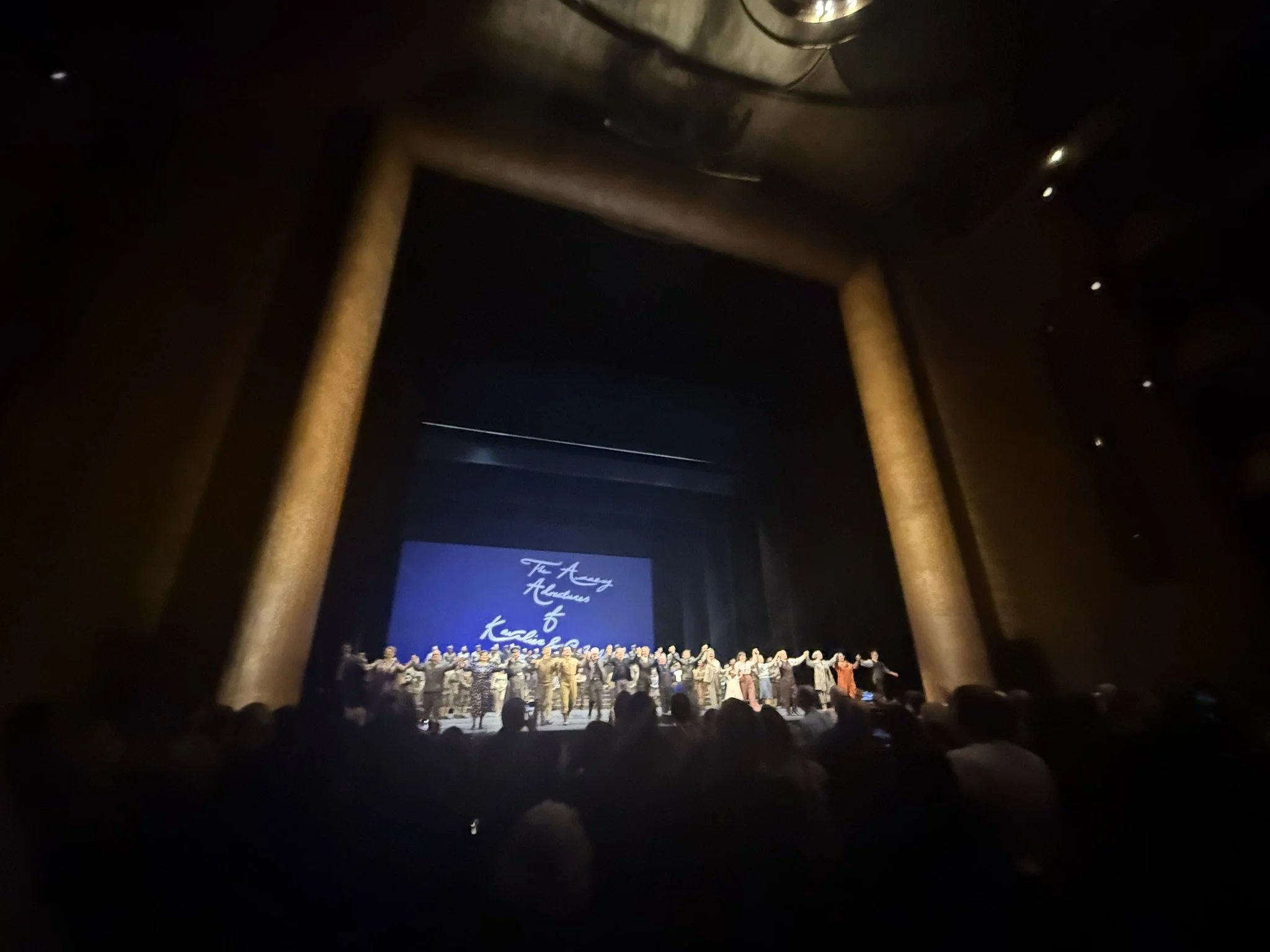Mason Bates hung speakers from the ceiling of the world’s largest opera house, which convinced someone who had enjoyed Detroit, German techno, or other electronica that a fine symphonic experience was the event. The sound filled the vast space of the Met. Met orchestra, including Wagner tubas, was layered with electronics. Speakers were positioned on both sides of the stage and from the ceiling, blending electronic sound as if to create a new species, resonance, and power in the orchestra. Whereas I usually find PA effects distracting, they were intricately integrated. For someone like me, who has enjoyed both classical and electronic music, it was a new sensation to experience The Amazing Adventures of Kavalier & Clay at the Metropolitan Opera.
This is what Opera should have been doing with new music for a long time, but hasn’t. Based on Michael Chabon’s Pulitzer Prize–winning novel, this opera, with music by Mason Bates and a libretto by Gene Scheer, compresses into about two and a half hours. The stage shifts between Nazi-occupied Prague, New York, and the animated comic world projected behind the singers. The story follows the painter Joe Kavalier, who escapes to Brooklyn and joins his cousin Sam Clay in creating an anti-fascist superhero, hoping to save his family, only to be drawn into even greater turmoil. Themes of exile, art, history, war, and homosexuality intersect in complex ways.
The staging utilized sliding walls and projected visuals, with scenes unfolding like the turning pages of a comic book. The sequences in which characters were drawn in animation, while the orchestra and electronics fused, were thrilling. Yet in other parts, the narrative was too complex and moved too quickly; there were no melodies, singing, or dramatic scenes that truly stayed with me. I never lost myself in the story or felt my heart stilled in immersion. Even so, the sonic experience created by the speakers and the full orchestra was unlike anything else.
The Amazing Adventures of Kavalier & Clay
Thursday, October 2, 2025, 7:30–10:25PM
Conductor, Yannick Nézet-Séguin
Sarah Kavalier, Lauren Snouffer
Joe Kavalier, Andrzej Filończyk
Gerhard, Craig Colclough
Sam Clay, Miles Mykkanen
Esther Klayman, Eve Gigliotti
Solomon Kavalier, Richard Croft
Sheldon Anapol, Patrick Carfizzi
Estelle Kavalier, Ellie Dehn
Radio Announcer, Nathan Carlisle
Harry, John Moore*
Tracy Bacon, Edward Nelson
Helen, Amanda Batista*
Rosa Saks, Sun-Ly Pierce
Salvador dalí, Efraín Solís
Undercover FBI agents Garen McRoberts, Jonathan Elmore
sgt. saldo, Ross Benoliel
Wounded soldier, Ned Hanlon
Escapist, Jerimy Rivera
Dick Johnson, Steven M. Warnock
Young Sarah, Helen Rtveliashvili Mangan
Luna moth, Bonnie Wright
Mandolin/Guitar Nathan Huvard
メトロポリタン歌劇場で新作《カヴァリエ&クレイ》を体験した。支配人がいう、長い間オペラが取り組むべきだった新しい音楽を生み出そうとする試みだ。マイケル・シャボンのピューリッツァー賞受賞小説を原作とするこのオペラは、メイソン・ベイツの音楽とジーン・シェアの台本によって、600ページの小説を約2時間半に圧縮。舞台はナチス占領下のプラハとニューヨーク、そして歌手たちの背後に投影されるアニメーションのコミック世界へと移り変わる。ナチスから逃れてブルックリンにたどり着いた画家ジョー・カヴァリエと、いとこのサム・クレイが反ファシズムのスーパーヒーローを創作し家族を助けようと試みたり、その後大変なことに巻き込まれていく。亡命、芸術、歴史、戦争、そして同性愛といったテーマが複雑に交錯する。
このオペラの最大の特徴は、メットの巨大な空間で響いた音響だ。ワーグナーチューバを含む大編成オーケストラに、電子音やサンプリングが重ね合わされる。巨大なスピーカーが舞台両端や天井から吊り下げられ、メットのオーケストラが本来持つ繊細な響きや迫力を損なわずに、電子音が見事にブレンドされていた。昨年の《影のない女》を含め、PA効果はいつも違和感を感じるが、今回は緻密に練り込まれ、クラシックとエレクトロをそれぞれ楽しんできた自分にとって新感覚だ。
舞台はスライドする壁に映像を映し出し、場面がまるで漫画のページをめくるように展開していく。キャラクターを描いていくアニメーションにオケとエレクトロのサウンドが重なる場面は最高だった。しかし他の場面では複雑で展開が早すぎて、心に残るメロディも歌唱も、ドラマもなく、どこかに感情移入して心が静かになったり、時間を忘れて夢中になることはなかった。それでもメットの巨大スピーカーとフルオーケストラが生み出した音響体験は他に類がない。ベイツが世界最大の歌劇場の天井に丸出しのスピーカーを吊り下げ、デトロイトやベルリンのテクノも長年楽しんできた人間を交響体験として納得させたのは事件だ。
Review: A ‘Kavalier & Clay’ Opera Doesn’t Meet Its Moment
The Composer Bringing ‘Symphonic Electronica’ to the Met
Story
Act I
In the early days of World War II, Joe Kavalier escapes from Prague, leaving behind his parents and teenage sister, Sarah, and arrives in Brooklyn to live with his cousin Sam and aunt Esther. He plans to make enough money to bring his family to the United States to escape the German occupation. Joe, a gifted artist and amateur magician and escape artist, and Sam, a wisecracking writer, create a comic-book superhero to rival Superman and use their comic-book stories to urge Americans to join the fight against the Nazis. Sam’s boss at a toy and novelty company, Mr. Anapol, takes a chance on them and backs the venture. The Escapist becomes a hit, spawning a radio show. Attending a broadcast, Joe and Sam meet Tracy Bacon, the actor who plays the Escapist. Joe also meets Rosa, a talented artist who works for the Jewish Children’s Fund, which ferries refugee children from Europe to the U.S. on its own ship, The Ark of Miriam. Joe and Rosa attend a gallery show benefiting the Jewish Children’s Fund, where Salvador Dalí entertains the crowd and Joe helps him escape near suffocation after the artist gets trapped in a diving helmet. Joe and Rosa discuss arranging for Sarah to board The Ark of Miriam, and as they plan for the future, they fall in love. In Prague, Joe’s mother is captured by the Germans and sent to a camp, and Joe’s father is taken in a raid led by Gestapo Commander Gerhard, as Sarah narrowly escapes. Joe and Rosa’s relationship blossoms, and Rosa confirms Sarah’s passage on The Ark of Miriam. Meanwhile, Sam and Tracy Bacon have fallen for each other. They share a Shabbat dinner with Sam’s mother, toasting the imminent arrival of Sarah’s ship in New York, and spend a romantic night atop the Empire State Building, where they discuss their plan to take a train west to Hollywood. When they discover a newspaper headline reporting The Ark of Miriam has been sunk by German torpedoes, they race to tell Joe, who is performing his magic act at a benefit for the Jewish Children’s Fund. They have Rosa tell him the news, and before a room filled with dinner guests, Joe has a breakdown.
Act II
Joe’s mental deterioration continues, worsened by the news of his parents’ and sister’s deaths. Hiding out in a warehouse, he imagines a surreal confrontation with Gerhard. Rosa, meanwhile, hasn’t heard anything from Joe for weeks and can’t find him anywhere. Acting on a clue, she goes to the warehouse and finds a makeshift studio Joe has set up but has trashed, a sign of his fraught mental state. Rosa also finds evidence indicating that Joe enlisted in the military and has shipped out. Sam, meanwhile, is attending a going-away party for Tracy, who has joined the military. The party turns out to be an exclusively gay affair, and when it is raided by the FBI, Sam hides while the others are arrested. A lingering FBI agent discovers Sam and sexually assaults him. Rosa finds a broken Sam, who can only say he is finished: He’s convinced he will be alone for the rest of his life. Rosa is distraught as well—not only has Joe disappeared without a farewell, but she’s also learned she’s pregnant. Sam offers to marry her and raise the child as his own. Rosa agrees, and they begin a life together, with Rosa filling in for Joe drawing the Escapist—along with a new character, Luna Moth, inspired by a story Joe made up for Rosa. Joe ends up on a battlefield in Europe, where he finds Tracy. Tracy shows Joe a letter from Sam telling Tracy to stop writing to him. Tracy is surprised to learn Joe has never opened any of the hundreds of letters Rosa has sent him—if he had, Joe would have learned that he has a child. Tracy is killed, and Joe is devastated by another loss. He starts opening and reading Rosa’s letters. One letter contains Rosa’s drawing of Luna Moth, who now appears to Joe and guides him out of the battlefield and to the house on Long Island where Rosa and Sam live. Outside the door, Sarah appears and gives Joe the final push to reenter his life, leading Joe to meet his young daughter, who is also named Sarah, and to reunite with Rosa and Sam. Sam boards a train headed for California and picks up his pen to begin writing The Amazing Adventures of Kavalier & Clay.
—Paul Cremo
Surface and Soul: The Amazing Worlds of Kavalier & Clay by Bates
The afternoon I showed up at Michael Chabon’s home in Berkeley, making a pilgrimage across the Bay to ask for his blessing for an adaptation of his magnum opus, I noticed a small comic-book store around the corner and decided to pop in. Remarkably, the store was called The Escapist—an homage to the superhero from The Amazing Adventures of Kavalier & Clay— and sold a comic-book series of the same name. What Michael conjured in novelistic form had now taken on a spectacular life in both the real world and in the hands of contemporary comic-book artists. As I stood in the corner of the shop, I realized that the vast world-building of Kavalier & Clay was continuing to expand in the palm of my hand. How deeply grateful we are to further explore this iconic story on the stage of the Metropolitan Opera.
The three worlds of this sprawling epic make for storytelling on a grand scale. We open in the darkness of Prague amidst the Nazi occupation, then move to exuberant New York in the swinging 1940s, and soon enter the technicolor world of comic-book art. But underneath these glistening surfaces is a soulful story of two cousins desperately trying to make enough money to get their family out of war-torn Europe. In the process, they each fall in love and endure extraordinary tragedy. Passion, desperation, art, and war all swirling around a love quartet: That’s the stuff of opera.
These three worlds are brought to life by vastly different musical forces. Prague amidst the occupation has a dark mix of edgy strings and mandolin, analog synthesizers, and Wagner tubas (for the Nazis, duh). As soon as we step into New York, we hear a reimagined big band of saxophones, rhythm section, and swaggering brass. And when Joe Kavalier and Sam Clay pick up their pens, we enter a magical world of symphonic electronica, with pulsing techno rhythms dancing with quicksilver orchestral textures. At first presented separately in
Act I, these musical worlds collide as Joe undergoes a psychedelic breakdown in Act II. Within the colorful milieu of these worlds are the journeys of the opera’s characters, all of whom express themselves through leitmotifs that travel with them throughout the show. Their arias tether us to the soulful heart of the story. Sometimes, the tunes reveal themselves only gradually: For example, the melodies that bloom in the love duets first appear almost unnoticed in the background, slowly threading into our consciousness as the courtships progress. The juxtaposition of new and old has fascinated me in both the concert hall and the opera house; there’s no reason techno, sound design, and tuneful arias can’t dance together.


